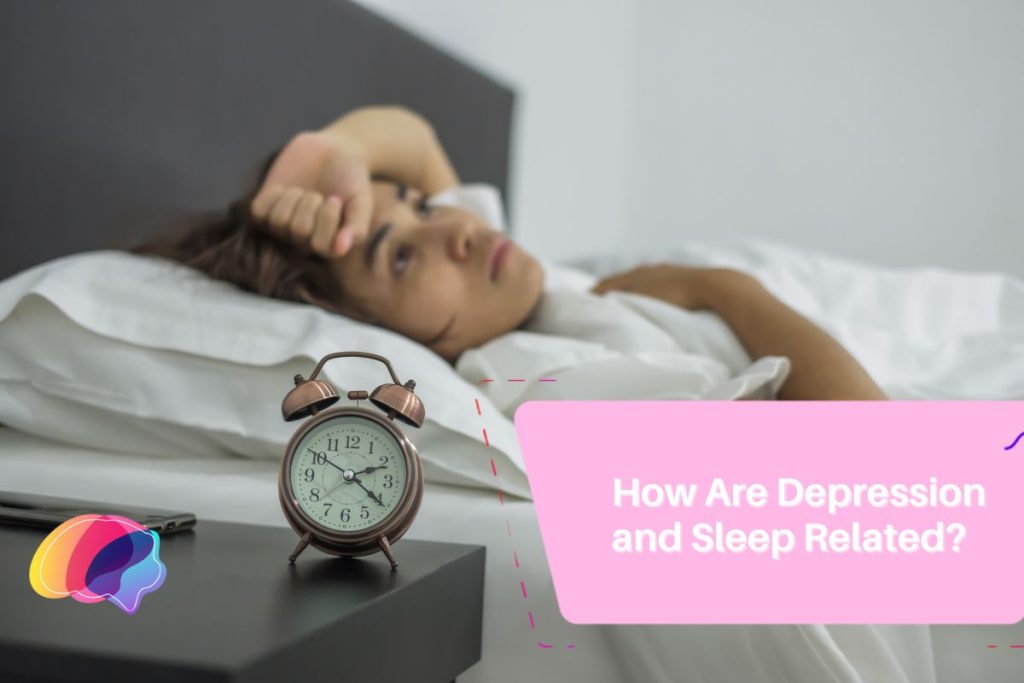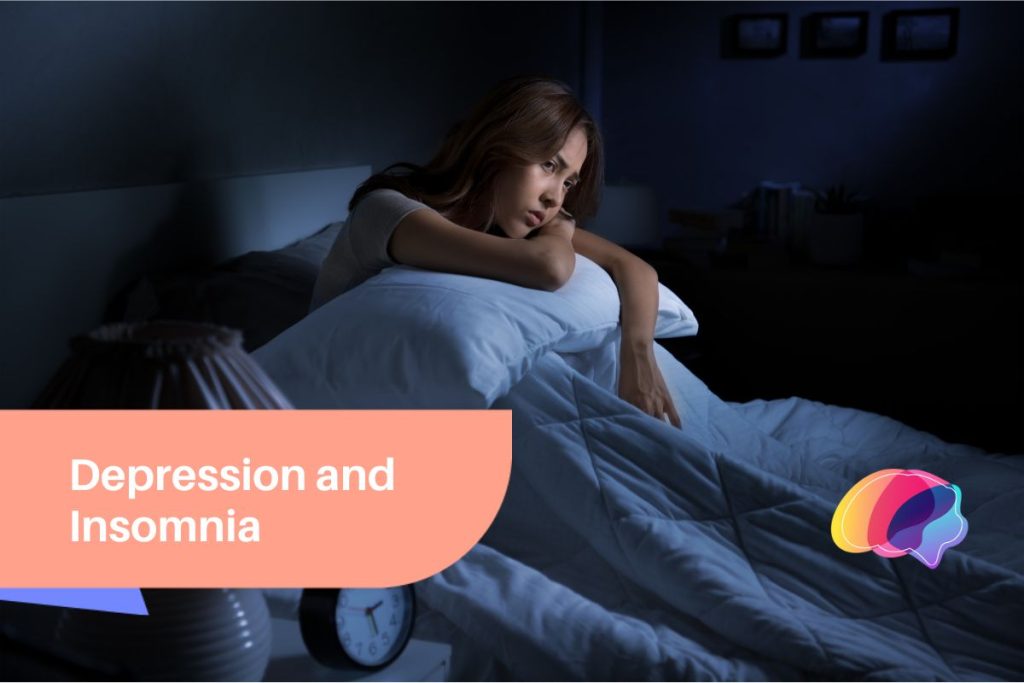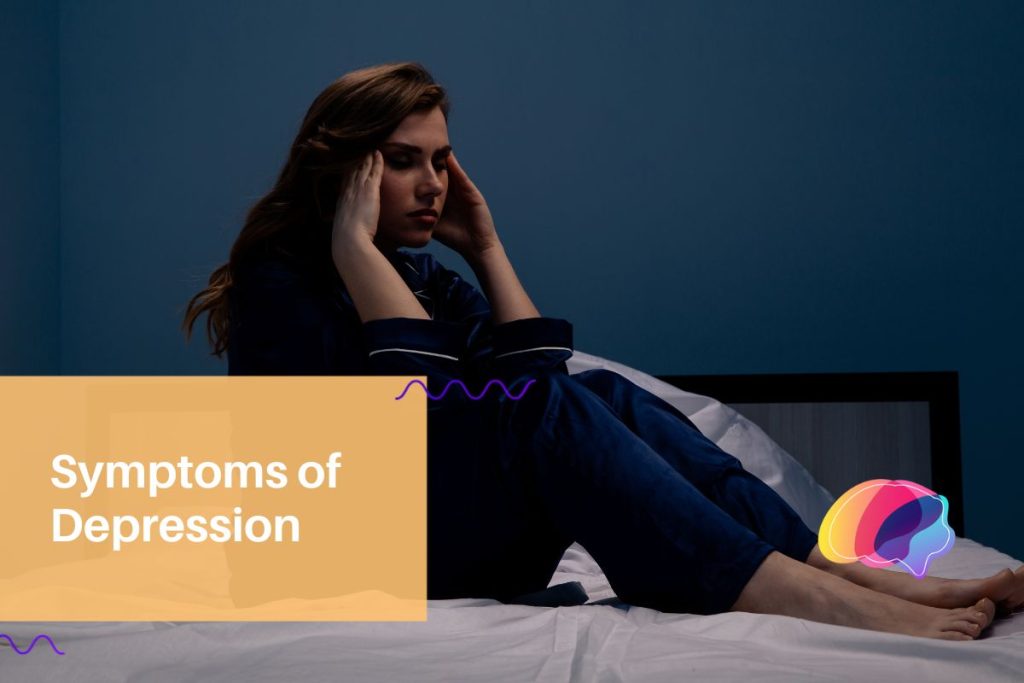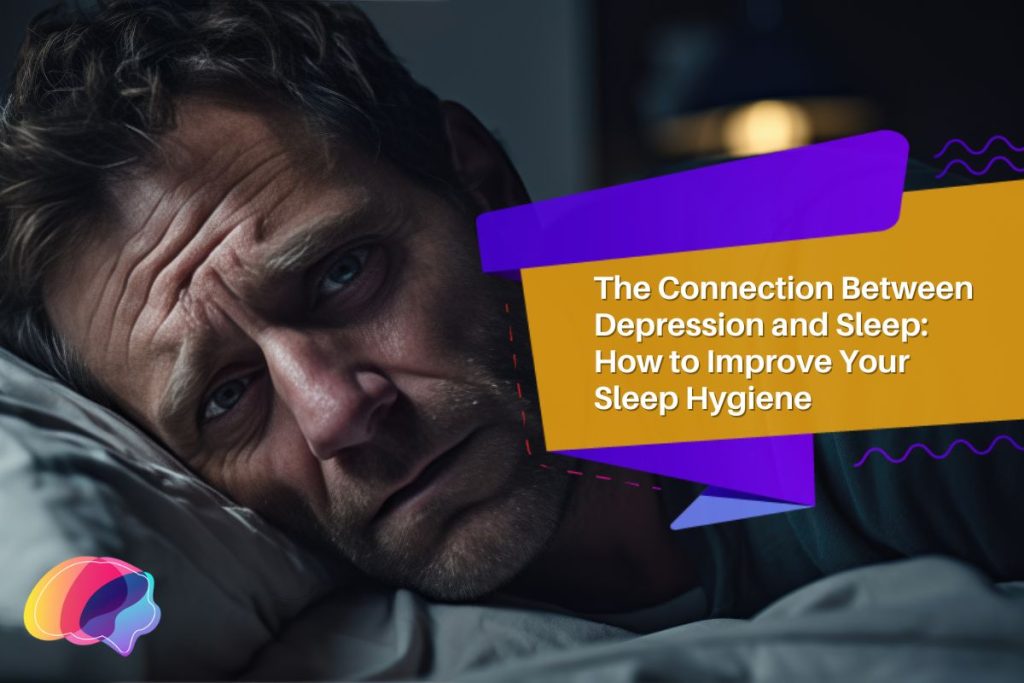Depression is a widespread mental health disorder that can take a heavy toll on a person’s life. Over 280 million people around the world suffer from depression, according to the World Health Organization (WHO). It affects people of all ages and backgrounds and can have exhausting effects on their daily lives.
One of the most common symptoms of major depressive disorder is difficulty sleeping. It’s no surprise that the two are related, as depression and sleep are closely tied to our physical and mental health. Poor quality sleep can lead to various problems, including increased irritability, difficulty concentrating, fatigue, and an overall lack of motivation. Understanding the connection between depression and sleep can help us take steps to improve our sleep hygiene.
How Are Depression and Sleep Related?
When a person suffers from depression, they may have difficulty falling asleep or staying asleep throughout the night. They may also wake up too early and cannot go back to sleep. This can be caused by an underlying medical condition or depressive symptoms.
A. What is Sleep Hygiene
Sleep hygiene refers to practices and habits essential for ensuring good sleep quality and maintaining a healthy sleep-wake cycle. These practices are crucial for everyone but are particularly significant in depression. Depression is a complex mental health condition that can disrupt sleep patterns, and poor sleep can, in turn, worsen depressive symptoms.
It includes maintaining a consistent sleep schedule, creating a comfortable sleep environment, avoiding stimulants like caffeine and nicotine close to bedtime, and engaging in relaxation techniques to prepare the body and mind for sleep. Establishing these routines can help individuals with depression in several ways.
Firstly, good sleep hygiene can regulate circadian rhythms, which are closely linked to mood regulation. Disrupted sleep patterns can lead to dysregulation in mood, potentially worsening depressive symptoms. Consistency in sleep can help stabilize mood and create a sense of predictability in one’s life.
Secondly, adequate and corrective sleep is essential for cognitive functioning and emotional regulation. Poor sleep can impair decision-making, problem-solving, and coping skills, making it harder for individuals with depression to manage their condition effectively. Good sleep hygiene promotes better cognitive and emotional resilience.
Moreover, practicing proper sleep hygiene can also help alleviate some physical symptoms of major depression, such as fatigue and low energy. By improving sleep quality, individuals with depression can experience increased daytime alertness and motivation, making it easier to engage in therapeutic activities and maintain social connections, which are vital for managing depression. It’s essential to have mental health support if you have trouble falling asleep.
B. Sleep Problems Associated with Depression
Depression and sleep disturbances often go hand in hand, creating a challenging cycle that can enhance the symptoms of both conditions. Common sleep disturbances or problems experienced by individuals with depression include:
Insomnia
Hypersomnia
Early Morning Awakening
Nightmares
Sleep Fragmentation
Restless Legs Syndrome (RLS) and Periodic Limb Movement Disorder (PLMD)
Daytime Sleepiness and Fatigue
Circadian Rhythm Disruptions
Obstructive Sleep Apnea
If you are experiencing any of these symptoms, you must talk to your doctor or mental health professional. There are effective treatments for acute and clinical depression and sleep disturbances that can help you manage both conditions more effectively.

C. Depression and Insomnia
The bidirectional relationship between insomnia and major depression is the complex and mutually reinforcing connection between these conditions. It means that insomnia can contribute to the development or increase of depression. Conversely, depression can lead to or worsen insomnia. This dynamic relationship can create a vicious cycle, making managing both conditions more challenging. Here’s how it works:
Insomnia Leading to Depression:
Sleep Deprivation: Chronic insomnia, characterized by difficulty falling or staying asleep, can lead to sleep deprivation. Sleep is crucial for physical and mental well-being. When individuals consistently don’t get enough sleep, it can affect their mood, understanding, and emotional resilience.
Stress and Anxiety: Insomnia often causes heightened stress and anxiety as individuals worry about their inability to sleep and its consequences. Chronic stress and anxiety are well-known risk factors for the development of depression.
Reduced Coping Skills: Sleep-deprived individuals may have reduced coping mechanisms to deal with life stressors, making them more susceptible to developing depressive symptoms when faced with challenges.
Depression Leading to Insomnia:
Altered Brain Chemistry: Depression can lead to changes in brain chemistry, including imbalances in neurotransmitters like serotonin and norepinephrine. These changes can disrupt the sleep-wake cycle and make maintaining a regular sleep pattern. If this is left untreated, you might need clinical sleep medicine.
Psychological Factors: Depressed individuals often experience negative thought patterns, contemplation, and emotional distress, especially at night. These psychological factors can interfere with sleep onset and maintenance. It can even lead to the development of a secondary mental illness.
Physical Symptoms: Physical symptoms of depression, such as restlessness, fatigue, and changes in appetite, can also disrupt sleep patterns.
Vicious Cycle of Depression and Insomnia
As insomnia and depression feed into each other, a vicious cycle can develop. Insomnia worsens depressive symptoms, leading to more significant sleep disturbances, which, in turn, worsen depression. This cycle can result in more severe and treatment-resistant depression. The stress from such a cycle can increase the risk of substance abuse.

D. Symptoms of Depression
Depression is a multifaceted mental health condition characterized by emotional, cognitive, and physical symptoms. Many of these symptoms can significantly impact sleep quality. Here are some common depressive symptoms and how they can affect sleep:
Persistent Sadness: A pervasive feeling of sadness or emptiness, which can lead to nighttime rumination and difficulty falling asleep.
Loss of Interest or Pleasure (Anhedonia): A lack of interest in activities that were once enjoyable can contribute to insomnia, as there may be little motivation to engage in relaxing bedtime routines.
Fatigue and Low Energy: Constant feelings of fatigue and low energy can lead to excessive daytime sleepiness and hypersomnia, even if nighttime sleep is disrupted.
Irritability: Irritability can make it challenging to relax and wind down before bedtime, contributing to difficulty falling asleep.
Difficulty Concentrating: Cognitive difficulties associated with depression can result in racing thoughts and overthinking at night, making it harder to initiate sleep.
Feelings of Guilt or Worthlessness: These negative self-perceptions can increase anxiety, contemplation, and awakenings.
Changes in Appetite and Weight: Depression can lead to changes in eating habits, potentially affecting sleep through discomfort from overeating or hunger pangs at night.
Psychomotor Agitation or Retardation: Agitation can make it challenging to settle down for sleep, while psychomotor retardation may result in excessive daytime sleepiness.
Suicidal Thoughts: Disturbing thoughts can intrude on nighttime consciousness, causing insomnia and nightmares.
Physical Symptoms: Aches, pains, and gastrointestinal discomfort associated with depression can disrupt sleep comfort and quality.
Anxiety and Worry: Anxiety symptoms often accompany depression, leading to increased nighttime anxiety, racing thoughts, and sleep-onset insomnia.
Social Isolation: Isolation can lead to irregular sleep patterns and a lack of social cues that help regulate sleep-wake cycles.

Tips for Sleeping Better with Depression
Sleeping better is essential for managing depression and other mental health conditions. Here are some tips to help you improve your sleep with depression:
Talk to a Therapist
Depression and sleep problems are linked, with insomnia or disrupted sleep often a symptom of depression. Many people find that talking to a therapist is an effective way to identify the root causes of their sleep problems, address any underlying psychological issues, and develop strategies for better managing their symptoms. Research shows psychotherapy can help manage depression and chronic insomnia; cognitive behavioral therapy (CBT) is often used to address both conditions.
Turn Your Bedroom into a Sleep Sanctuary
You need to create a conducive sleep environment in your bedroom to get a good night’s rest. The key components of a sleep sanctuary are darkness, quietness, and temperature. Ensure your bedroom is dark enough by using blackout curtains or an eye mask; keep noise levels low with earplugs or white noise machines; and make sure the temperature in your bedroom is cool (between 60-67°F). Other things to consider include eliminating electronics from the bedroom, using comfortable and breathable bedding, and avoiding eating late at night. These steps can help you create a sleep-friendly environment that leads to better quality rest.
Keep a Consistent Sleep Schedule
Another important thing is to have consistency and routine in sleep hygiene. A regular sleep schedule helps your body learn when to sleep and wake up and can help regulate your circadian rhythm. Aim to go to bed at the same time every night and get up at the same time each morning, even on weekends or days off. Keeping consistent habits will help you fall asleep faster and stay asleep longer.
Nap Carefully
Napping can benefit those with depression or sleep problems, as it can help restore energy levels and improve concentration. Experts recommend taking a nap in the afternoon if possible, although keep it short (no longer than 30 minutes). The pros of napping for those with depression include improved energy levels, better concentration, and a short-term boost in mood. It can help fill gaps between sleep episodes. However, the cons of napping with depression include any potential interference with nighttime sleep if it is too long or taken too close to bedtime and an overall lack of quality rest.
Avoid Alcohol
It’s important to avoid alcohol when trying to improve your sleep and manage depression. While it can help you fall asleep faster, alcohol disrupts deep sleep and reduces REM sleep, essential for feeling rested. Additionally, research shows that drinking alcohol can worsen depression by interfering with neurotransmitters in the brain, leading to an increased risk of suicide. If you are struggling with depression and sleep problems, it’s best to avoid drinking alcohol.
Start Exercising Regularly
Exercise has long been considered a viable solution for sleep and depression. Studies have found that regular physical activity improves sleep quality, reduces insomnia symptoms, and can help you fall asleep more quickly. Exercise also helps to reduce stress levels, boost endorphins (the “feel-good” hormones), and increase energy levels – all key components for managing depression. Research shows that aerobic physical activity is the most effective form of exercise for improving sleep and mental health; experts recommend at least 150 minutes per week for adults.
Get Outside
Spending time outdoors is an important part of regulating your sleep and mood. Natural sunlight helps to set the body’s internal clock or circadian rhythm; this helps to keep you awake during the day and sleepy at night. Additionally, research shows that outdoor activities can improve mental health by reducing stress, increasing energy, and improving concentration. Get outside for at least 30 minutes daily and get direct sunlight each morning. This will help you maintain a regular sleep schedule and ensure your circadian rhythm is functioning properly.
The key to managing depression and improving sleep quality is finding the right balance of lifestyle factors. It may take some trial and error, but it’s important to be patient and determine what works best for you.

When to Speak with Your Doctor
Experience any of these symptoms for more than two weeks. It may be time to speak with your doctor about options for treating depression. Your doctor will likely ask questions about your lifestyle, family history, and other factors that may influence your mental and physical health. They can then suggest a plan of action best suited to your needs.
In addition, it’s important to schedule regular check-ups with your doctor even if you don’t feel depressed or tired. This way, they can monitor your mental and physical health changes over time. Also, remember that it’s important to be open and honest with your doctor when discussing your symptoms, as this will help them better understand your needs.
Treatments for Depression
Treating depression can involve a combination of medication, therapy, lifestyle changes, and other treatments. Medications such as antidepressants can help to reduce the symptoms of depression and stabilize moods. However, some medications may cause side effects that interfere with sleep. It’s important to discuss any potential side effects with your doctor before taking any medications.
Therapy can also play an important role in managing depression. Cognitive Behavioral Therapy (CBT) is a form of psychotherapy that can help to identify and address negative thought patterns connected to depression. This type of therapy can be beneficial for better understanding why you’re feeling the way you are and for developing strategies to cope with the symptoms of depression.
Finally, lifestyle changes can also help to improve mental health and reduce the symptoms of depression. This includes regular exercise, eating healthy foods, getting enough sleep, and engaging in activities that bring you joy. By making small lifestyle changes every day, it can be possible to manage your depression and improve your overall quality of life.
Treating Your Depression at Lucid Wellness Center
Discover a comprehensive resource for depression treatment at Lucid Wellness Center. Take charge of your mental health and explore the transformative benefits of Transcranial Magnetic Stimulation (TMS) therapy. Our expert team is dedicated to providing personalized and effective care, offering hope to individuals with treatment-resistant depression. Don’t wait to find relief and lasting improvement in your well-being. Schedule a free initial consultation with our board-certified psychiatrist today and embark on a journey toward a more fulfilling life with TMS therapy. Call us today at (323) 792-2071 or email us at [email protected] to learn more.
Frequently Asked Questions About Depression and Sleep
Can Depression Lead To Sleep Disorders?
Yes. Depression can lead to sleep problems such as insomnia, hypersomnia, and frequent nighttime awakenings. Sleep disturbances are often one of the first symptoms of depression to appear. Studies have found that people who struggle with depression also report experiencing more severe and longer-lasting symptoms when they don’t get enough sleep.
How Can I Improve My Sleep Hygiene?
Sleep hygiene is the practice of creating a sleep-friendly environment and lifestyle that promotes healthy sleep. To improve your sleep hygiene, try to go to bed and wake up at the same time each day, avoid using screens before bedtime, limit caffeine intake, exercise regularly, and relax before sleeping.
Do Depressed People Need More Sleep?
Depression can lead to a disruption in the body’s natural sleep-wake cycle. This can cause people to feel exhausted and sleepy during the day and difficulty sleeping at night. The amount of sleep needed varies from person to person. But generally speaking, depressed people may need more hours of sleep than those who are not depressed.
Why Is Sleep Hygiene Important for Mental Health?
Good sleep hygiene plays an important role in maintaining mental health. Adequate, restful sleep helps to regulate mood and emotions, boosts creative thinking, aids memory retention, and improves overall focus. Poor quality or insufficient sleep has been linked to certain mental health disorders such as depression and anxiety. As such, people with mental health issues should take extra care to practice well.
What Does Improved Sleep Hygiene Mean?
Improved sleep hygiene refers to the practice of creating a sleep-friendly environment and lifestyle that promotes healthy sleep. This typically includes going to bed and getting up at the same time each day, avoiding screens late at night, limiting caffeine intake, exercising regularly, and relaxing before sleeping.
How Does Sleep Hygiene Affect Sleep Quality?
Yes, good sleep hygiene habits can improve your sleep quality. Sleep hygiene practices such as limiting caffeine intake and avoiding screens close to bedtime can make it easier to fall asleep faster and stay asleep longer.
What Is the Relationship Between Poor Sleep and Mental Health?
Poor sleep is often linked to poor mental health. Insufficient or disrupted sleep can lead to mood swings, irritability, difficulty concentrating, and increased anxiety. On the other hand, restful sleep helps to regulate mood and emotions, boosts creative thinking, aids memory retention, and improves overall focus.
Is Sleep the Most Important Thing for Mental Health?
No, sleep is not the only important factor for mental health. Other factors such as nutrition, exercise, and stress management can also play a role in maintaining good mental health. Additionally, staying socially connected to friends and family can help to improve mood and overall well-being.
How Much Does Sleep Improve Mental Health?
Getting adequate restful sleep can have a significant impact on mental health. Studies have found that people who practice good sleep hygiene and get enough quality sleep tend to experience improved mood, better memory retention, increased creativity and focus, and reduced stress and anxiety levels.
Source:
Irish, L. A., Kline, C. E., Gunn, H. E., Buysse, D. J., & Hall, M. H. (2015). The role of sleep hygiene in promoting public health: A review of empirical evidence.Sleep medicine reviews, 22, 23–36. https://doi.org/10.1016/j.smrv.2014.10.001
Gupta, R., Lahan, V., & Goel, D. (2013). Prevalence of restless leg syndrome in subjects with depressive disorder.Indian journal of psychiatry, 55(1), 70–73. https://doi.org/10.4103/0019-5545.105515
Kennedy S. H. (2008). Core symptoms of major depressive disorder: relevance to diagnosis and treatment.Dialogues in clinical neuroscience, 10(3), 271–277. https://doi.org/10.31887/DCNS.2008.10.3/shkennedy
Riemann, D., Krone, L. B., Wulff, K., & Nissen, C. (2020). Sleep, insomnia, and depression.Neuropsychopharmacology : official publication of the American College of Neuropsychopharmacology, 45(1), 74–89. https://doi.org/10.1038/s41386-019-0411-y


